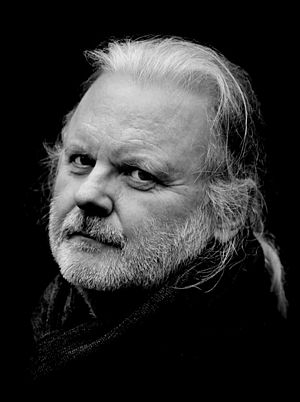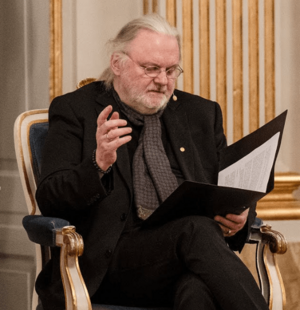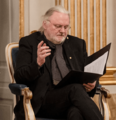Jon Fosse facts for kids
Quick facts for kids
Jon Fosse
|
|
|---|---|
 |
|
| Born | Jon Olav Fosse 29 September 1959 Haugesund, Rogaland, Norway |
| Occupation |
|
| Education | University of Bergen (BA) |
| Literary movement | Minimalism |
| Notable awards | Nobel Prize in Literature (2023) |
| Spouse |
|
| Children | 6 |
Jon Olav Fosse (born 29 September 1959) is a famous author, translator, and playwright from Norway. In 2023, he won the Nobel Prize in Literature. He received this award for his special plays and stories. These works are known for expressing feelings and ideas that are hard to put into words.
Fosse has written more than seventy books, poems, and plays. His works have been translated into over fifty languages. He is the most performed Norwegian playwright after Henrik Ibsen. His plays are shown on more than a thousand stages around the world. This makes him one of the most popular living playwrights globally. His plays often use simple language and deep thoughts. They are sometimes described as being like poetry.
Contents
About Jon Fosse
Jon Fosse was born in 1959 in Haugesund, Norway. He grew up in a place called Strandebarm. His family had strong spiritual beliefs, which influenced him. When he was seven, he had a serious accident. This experience made him think deeply about life and perhaps helped him become a writer.
He started writing when he was about twelve years old. As a teenager, Fosse wanted to be a rock guitarist. He also played the fiddle. He began to write more when he decided not to pursue music. Much of his early writing involved creating lyrics for songs. When he was young, he was interested in different ideas about how society could work.
His Education and Early Works
Fosse went to the University of Bergen. There, he studied literature and began writing in a Norwegian language called Nynorsk. His first novel, Raudt, svart (Red, Black), came out in 1983. This book was different from other popular stories in Norway at the time. It focused more on the way words were used than on the plot.
He published another novel, Stengd gitar (Closed Guitar), in 1985. A collection of his poems, Engel med vatn i augene (Angel with Water in Its Eyes), followed in 1986. He earned a master's degree in literature in 1987. After that, he published his third novel, Blod. Steinen er (Blood. The Stone Is). In the early 1990s, he continued to publish novels. He also worked on translating other authors' books.
His Plays and Other Writings
Fosse's first play, Og aldri skal vi skiljast (And We'll Never Be Parted), was performed and published in 1994. Since then, Fosse has written many novels, short stories, poems, children's books, essays, and plays. His works have been translated into more than forty languages. Besides writing his own books, Fosse also translates works by other authors. He even wrote the story for an opera called Asle og Alida, which was composed by Bent Sørensen.
His Writing Style
Jon Fosse writes in nynorsk, one of Norway's official languages. His plays are seen as a modern continuation of the style of Henrik Ibsen. Ibsen was a very important Norwegian playwright from the 19th century. Fosse's stories are often described as being more like poetry than typical novels. He considers himself a poet, no matter what type of writing he is doing. The area where Fosse grew up, Vestlandet in Norway, often inspires his writing.
Fosse has mentioned that writers like Samuel Beckett, Georg Trakl, and Thomas Bernhard have influenced him. Other authors and books that have shaped his life and work include Olav H. Hauge, Knut Hamsun, Tarjei Vesaas, Franz Kafka, William Faulkner, Virginia Woolf, and the Bible.
Awards and Special Recognition
Jon Fosse is one of Norway's most celebrated writers. He is the most performed Norwegian playwright after Henrik Ibsen.
In 2003, France honored Fosse by making him a chevalier of the Ordre national du Mérite. He was also listed among the Top 100 living geniuses by The Daily Telegraph newspaper.
Since 2011, Fosse has been allowed to live at the Grotten. This is an honorary residence owned by the Norwegian state. It is located near the Royal Palace in Oslo. The King of Norway grants the use of the Grotten as a permanent home to people who have made great contributions to Norwegian arts and culture. Fosse also helped with Bibel 2011, a Norwegian translation of the Bible published in 2011. In 2015, he won the Nordic Council's Literature Prize for his trilogy of novellas: Andvake (Wakefulness), Olavs draumar (Olav's Dreams), and Kveldsvævd (Weariness).
Many of Fosse's works have been translated into Persian. His plays have been performed on major stages in Tehran, Iran. Six of his plays have also been translated into American English. These plays have been performed in New York City and Pittsburgh, Pa.. Some of these translated works include Night Sings its Songs (2004) and A Summer Day (2012).
In April 2022, Fosse's novel A New Name: Septology VI-VII was a finalist for the International Booker Prize. The book was also a finalist for the 2023 National Book Critics Circle Award in Fiction.
The Nobel Prize in Literature

In October 2023, Jon Fosse received the Nobel Prize in Literature. He was honored for "his innovative plays and prose which give voice to the unsayable." This made him the first writer using the Nynorsk language to win the prize. He is also the fourth Norwegian to receive this award. Other Norwegian winners include Bjørnstjerne Bjørnson (1903), Knut Hamsun (1920), and Sigrid Undset (1928).
Jon Fosse was a favorite to win the prize in 2023. Many people had expected him to win for about ten years. The choice was generally well received by critics and readers. People described his writing as unique and powerful. Fosse himself told NRK, a Norwegian broadcaster, that he was "surprised but also not" to have won. He had been preparing for the possibility for a decade.
Jon Fosse gave his Nobel lecture on 7 December 2023. It was titled The Silent Language. In his speech, he talked about the differences between spoken and written language. He also discussed how silence is used in his works. At the award ceremony, Anders Olsson from the Swedish Academy described Fosse's writing as having "hypnotic power."
Personal Life
Jon Fosse has been married three times and has six children. He spends part of his time with his third wife, Anna, in Austria. He also has homes in Bergen and other parts of western Norway. In 2012–2013, he joined the Catholic Church. He has said that his conversion to Catholicism helped him in his life. Fosse enjoys quiet time. He avoids noise, does not watch television or listen to the radio, and rarely listens to music. He sees writing as a very personal act, almost like a prayer.
List of Awards
- 1992 Nynorsk Literature Prize
- 1996 Ibsen Prize
- 1997 Aschehoug Prize
- 1999 Søren Gyldendal Prize
- 1999 Dobloug Prize
- 2000 Nestroy Theatre Prize
- 2000 Nordic Playwright Prize
- 2003 Norsk kulturråds ærespris
- 2003 Nynorsk Literature Prize
- 2003 Chevalier of the Ordre national du Mérite of France
- 2004 Diktartavla Prize
- 2005 Brage Prize
- 2005 Commander of the Royal Norwegian Order of St. Olav
- 2006 Anders Jahres Culture Prize
- 2007 The Swedish Academy Nordic Prize
- 2007 The Federal Ministry of Family Affairs' Deutscher Jugendliteraturpreis
- 2010 The Ibsen Award
- 2012 Target Prize
- 2014 European Prize for Literature
- 2015 Nordic Council Literature Prize
- 2016 Willy Brandt Prize
- 2019 Nynorsk Literature Prize
- 2021 Brage Prize for fiction
- 2023 Nobel Prize in Literature
Images for kids
See also
 In Spanish: Jon Fosse para niños
In Spanish: Jon Fosse para niños
 | Aaron Henry |
 | T. R. M. Howard |
 | Jesse Jackson |



